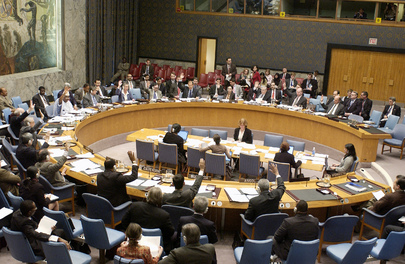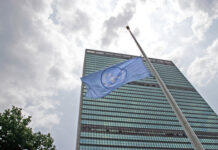This is the News in Brief from the United Nations.
Gaza fighting spreads into hospitals where there’s ‘no way in and out’
Amid continuing heavy fighting in Gaza on Tuesday, UN humanitarians expressed deep concern for patients and others seeking treatment who now have “no way in and out”.
Spokesperson for the UN World Health Organization (WHO) Christian Lindmeier confirmed that Al-Khair Hospital in Khan Younis was one of the two hospitals being raided and that Nasser Hospital was “basically besieged”.
Mr. Lindmeier underscored how desperate and hungry Gazans have taken to stopping aid convoys in their search for food.
“One of the convoys had mainly fuel for hospitals on it but the people were holding it up as multiple times it was trying to move forward and trying to leave and trying to get onto the road because they were so desperate looking for food.”
The WHO spokesperson added that only 14 hospitals still function in Gaza – seven in the north and seven in the south; health needs are overwhelming after more than three months of heavy bombardment by Israeli Defense Forces, triggered by Hamas-led terror attacks in Israel that left some 1,200 dead and approximately 250 taken hostage.
Half of Yemen’s children are malnourished, warns WHO
To Yemen, where Houthi attacks on shipping in the Red Sea in solidarity with Gaza risk reversing hard-won progress towards peace, the UN health agency WHO said on Tuesday.
After nearly a decade of conflict in Yemen, half the country’s children are malnourished and nearly 18 million people need health support, said WHO Representative Dr. Arturo Pesigan.
He warned that increasing insecurity has created particular problems in Hudaydah governorate where there are 135,000 internally displaced families and 916 camps.
The entire country is also “overwhelmed” by endemic diseases such as malaria, dengue, measles, diphtheria, and acute watery diarrhoea – which the WHO suspects is cholera and which has led to 13 deaths.
The disease first emerged among itinerant communities whose movement is difficult to track or control, Dr. Pesigan told journalists in Geneva. He noted that a drop in funding has significantly reduced the UN health agency’s ability to support lifesaving care to communities.
UN refugee agency raises alarm over dramatic rise in Rohingya deaths at sea
Almost 570 Rohingya refugees from Myanmar are reported to have died or gone missing last year while taking risky boat journeys across the Andaman Sea and the Bay of Bengal, the UN refugee agency (UNHCR) said on Tuesday.
Latest data indicated that out of the 4,500 Rohingya who attempted the journey last year, one in eight went missing or died.
Briefing journalists in Geneva, UNHCR spokesperson Matthew Saltmarsh said that the Andaman Sea and Bay of Bengal route was one of the deadliest stretches of water in the world:
“Most attempting these journeys were children and women – some 66 per cent of those embarking.”
Mr. Saltmarsh added that the number of those reported missing or dead is the highest since 2014.
In a single deadly incident in November 2023, some 200 Rohingya are believed to have drowned when their boat capsized and sank.
To prevent further loss of life, UNHCR continues to urge regional coastal authorities to take urgent action to guard against future tragedies.
Daniel Johnson, UN News.
Source of original article: United Nations (news.un.org). Photo credit: UN. The content of this article does not necessarily reflect the views or opinion of Global Diaspora News (www.globaldiasporanews.com).
To submit your press release: (https://www.globaldiasporanews.com/pr).
To advertise on Global Diaspora News: (www.globaldiasporanews.com/ads).
Sign up to Global Diaspora News newsletter (https://www.globaldiasporanews.com/newsletter/) to start receiving updates and opportunities directly in your email inbox for free.

































